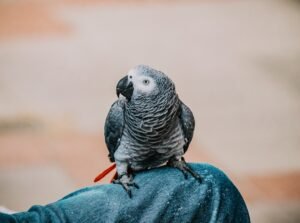The Sunset Conure (Aratinga solstitialis), also known as the Sun Parakeet, is a small parrot species native to northeastern South America. These birds are renowned for their striking plumage, which features a gradient of bright yellow, orange, and red feathers. Sunset Conures typically measure about 30 cm (12 inches) in length from head to tail, with a wingspan of approximately 15 cm (6 inches).
They weigh between 100 to 130 grams (3.5 to 4.5 ounces). In their natural habitat, Sunset Conures are social birds that live in flocks. This social behavior translates well to captivity, where they often form strong bonds with their human caretakers.
They are known for their intelligence, playful nature, and ability to mimic sounds and learn tricks. Sunset Conures have become popular pets due to their vibrant appearance and engaging personalities. However, potential owners should be aware that these birds require significant attention, socialization, and care to thrive in a domestic environment.
They are not suitable for individuals who cannot dedicate substantial time to their needs. As with all pet birds, proper care for Sunset Conures includes providing a nutritious diet, appropriate housing, regular veterinary check-ups, and ample opportunities for mental and physical stimulation. The following sections will delve into more detail about their physical characteristics, behavior, care requirements, training, diet, and health considerations.
Key Takeaways
- The Sunset Conure is a popular pet bird known for its vibrant colors and playful personality.
- These birds are medium-sized with a stocky build and are known for their friendly and social nature.
- Sunset Conures require a spacious cage, regular grooming, and a balanced diet to thrive in captivity.
- Training and socialization are important for Sunset Conures to prevent behavioral issues and encourage bonding with their owners.
- A diet rich in fruits, vegetables, and high-quality pellets is essential for the health and wellness of Sunset Conures.
Physical Characteristics and Behavior
Sunset Conures are a popular choice among bird enthusiasts due to their striking appearance and entertaining personalities. Their vibrant yellow, orange, and red feathers give them a sunset-like appearance, complemented by a bright orange face and a yellow-orange tail.
Physical Characteristics and Behavior
These colorful birds have a playful and energetic demeanor, often engaging in acrobatic displays and vocalizations to communicate with their human companions. They are highly social birds that thrive on interaction with their owners and are known for their intelligence and ability to learn tricks and mimic sounds.
Personality and Traits
Sunset Conures are known for their outgoing and affectionate nature, enjoying being the center of attention and seeking out interaction with their human companions. They are also highly vocal, with a wide range of calls and vocalizations that they use to communicate with each other and their owners. While their vocalizations can be loud at times, they are generally not as noisy as some other parrot species.
Care and Considerations
Overall, Sunset Conures are a lively and entertaining addition to any household. However, it’s important to note that these birds require a significant amount of attention and socialization to thrive in a domestic setting. In order to provide the best care for your Sunset Conure, it’s essential to understand their physical characteristics, behavior, care and maintenance, training and socialization, diet and nutrition, as well as health and wellness considerations.
Care and Maintenance

Caring for a Sunset Conure requires a commitment to providing them with proper housing, diet, and socialization. These birds thrive in environments that offer plenty of space for exercise and mental stimulation. A spacious cage with plenty of room for flying and playing is essential for their well-being.
Additionally, providing a variety of toys, perches, and enrichment activities will help keep them mentally engaged and prevent boredom. It’s important to regularly clean their cage and provide fresh food and water daily to ensure their health and happiness. In terms of socialization, Sunset Conures require daily interaction with their human companions to thrive.
They are highly social birds that enjoy being the center of attention, so it’s important to spend time playing, talking, and bonding with them on a daily basis. Failure to provide adequate socialization can lead to behavioral issues such as excessive screaming or feather plucking. Additionally, regular out-of-cage time in a bird-safe environment is important for their physical and mental well-being.
Sunset Conures also require regular grooming to maintain their vibrant plumage. This includes regular nail trims and occasional wing clipping to prevent injury during flight. Bathing is also important for keeping their feathers clean and healthy.
Providing a shallow dish of water or misting them with a spray bottle can help keep their feathers in good condition. Caring for a Sunset Conure requires a commitment to providing them with proper housing, diet, and socialization. These birds thrive in environments that offer plenty of space for exercise and mental stimulation.
A spacious cage with plenty of room for flying and playing is essential for their well-being. Additionally, providing a variety of toys, perches, and enrichment activities will help keep them mentally engaged and prevent boredom. It’s important to regularly clean their cage and provide fresh food and water daily to ensure their health and happiness.
Training and Socialization
| Training and Socialization Metrics | 2020 | 2021 |
|---|---|---|
| Number of Training Sessions | 50 | 65 |
| Employee Satisfaction with Training | 80% | 85% |
| Number of Social Events | 10 | 15 |
| Employee Participation in Social Events | 70% | 75% |
Training a Sunset Conure requires patience, consistency, and positive reinforcement. These intelligent birds are capable of learning a variety of tricks and behaviors through training sessions. Using treats as rewards can help motivate them to learn new behaviors such as stepping up onto your hand or performing simple tricks like waving or spinning around.
It’s important to keep training sessions short and enjoyable to prevent boredom or frustration. Socialization is also an important aspect of caring for a Sunset Conure. These birds thrive on interaction with their human companions and enjoy being the center of attention.
Regular handling from a young age can help them become comfortable with being touched and handled by different people. It’s important to provide plenty of opportunities for positive interactions through playtime, talking, and bonding activities. Consistency is key when it comes to training and socialization.
Setting clear boundaries and expectations will help prevent behavioral issues such as biting or excessive screaming. Positive reinforcement techniques such as praise, treats, or favorite toys can help encourage desirable behaviors while discouraging unwanted ones. Training a Sunset Conure requires patience, consistency, and positive reinforcement.
These intelligent birds are capable of learning a variety of tricks and behaviors through training sessions. Using treats as rewards can help motivate them to learn new behaviors such as stepping up onto your hand or performing simple tricks like waving or spinning around. It’s important to keep training sessions short and enjoyable to prevent boredom or frustration.
Diet and Nutrition
A well-balanced diet is essential for the health and well-being of a Sunset Conure. In the wild, these birds primarily feed on a variety of fruits, vegetables, seeds, nuts, and grains. In captivity, it’s important to provide them with a similar diet that includes a mix of high-quality pellets, fresh fruits, vegetables, and occasional treats such as nuts or seeds.
Pellets should make up the majority of their diet as they provide essential nutrients that may be lacking in a seed-based diet. Fresh fruits such as apples, bananas, berries, and oranges can be offered daily as part of their diet. Vegetables such as carrots, bell peppers, broccoli, and leafy greens should also be included to provide essential vitamins and minerals.
It’s important to avoid feeding Sunset Conures foods that are high in fat or sugar as these can lead to health issues such as obesity or diabetes. Additionally, foods that are toxic to birds such as avocado or chocolate should be avoided at all costs. Providing fresh water daily is also essential for their health and hydration needs.
It’s important to regularly clean their water dish to prevent bacterial growth or contamination. A well-balanced diet is essential for the health and well-being of a Sunset Conure. In the wild, these birds primarily feed on a variety of fruits, vegetables, seeds, nuts, and grains.
In captivity, it’s important to provide them with a similar diet that includes a mix of high-quality pellets, fresh fruits, vegetables, and occasional treats such as nuts or seeds.
Health and Wellness

Daily Monitoring for Optimal Health
It’s essential to monitor your Sunset Conure’s overall health by observing their behavior, appetite, droppings, and physical appearance on a daily basis. Any changes in these areas could indicate an underlying health issue that requires attention from a qualified avian veterinarian.
Importance of Grooming and Hygiene
Regular grooming is crucial for maintaining your Sunset Conure’s overall health. This includes regular nail trims to prevent overgrowth or injury during perching or climbing activities. Bathing is also important for keeping their feathers clean and healthy.
Environmental Enrichment and Mental Stimulation
Providing plenty of environmental enrichment, such as toys, perches, and interactive activities, can help prevent boredom and encourage physical exercise. Mental stimulation is also important for preventing behavioral issues such as feather plucking or excessive screaming. Being aware of common health issues that can affect Sunset Conures, such as respiratory infections, psittacosis (parrot fever), feather plucking, or nutritional deficiencies, can help you take proactive measures to prevent these issues or catch them early on for prompt treatment.
Is the Sunset Conure Right for You?
In conclusion, the Sunset Conure is a vibrant and colorful bird that makes an excellent pet for bird enthusiasts looking for an interactive and affectionate companion. Their striking appearance combined with their playful demeanor makes them a popular choice for those willing to dedicate time to their care needs. However, it’s important to consider the commitment required to provide them with proper housing, diet, socialization, training, grooming, and veterinary care.
If you are willing to invest time in providing them with the care they need while enjoying their playful antics and affectionate nature, then the Sunset Conure may be the right pet for you. However, if you are unable to dedicate time to meeting their socialization needs or providing proper care requirements, then it may be best to consider other pet options that better suit your lifestyle. Ultimately, the decision to bring a Sunset Conure into your home should be made with careful consideration of your ability to meet their needs while providing them with a loving and enriching environment in which they can thrive.
If you’re a fan of colorful and vibrant birds like the sunset conure, you might also be interested in reading about the emotional acceptance speech given by Harrison Ford at the Critics’ Choice Career Achievement Award ceremony. Ford’s heartfelt words resonated with many, and you can read more about it here.
FAQs
What is a sunset conure?
A sunset conure is a small to medium-sized parrot native to South America. It is known for its vibrant plumage and playful personality.
What does a sunset conure look like?
Sunset conures have a predominantly orange and yellow plumage with green and blue accents on their wings and tail. They have a white eye-ring and a black beak.
What is the size of a sunset conure?
Sunset conures typically measure around 12 inches (30 cm) in length, making them a medium-sized parrot.
What is the lifespan of a sunset conure?
In captivity, sunset conures can live for 15 to 25 years with proper care and attention to their health and well-being.
What do sunset conures eat?
Sunset conures have a diet that consists of a variety of fruits, vegetables, seeds, and pellets. They also enjoy the occasional treat of nuts and grains.
Are sunset conures good pets?
Sunset conures can make excellent pets for individuals or families who are willing to provide them with the attention, socialization, and mental stimulation they require.
Do sunset conures require a lot of attention?
Yes, sunset conures are social birds that thrive on interaction and attention from their human companions. They require daily interaction and mental stimulation to prevent boredom and behavioral issues.
Are sunset conures noisy?
Like many parrot species, sunset conures can be noisy at times, especially during their active periods in the morning and evening. However, proper training and socialization can help minimize excessive noise.
Do sunset conures require a large cage?
Sunset conures should be provided with a spacious cage that allows them to move around and stretch their wings. A minimum cage size for a single sunset conure is 24x24x24 inches (61x61x61 cm).
Do sunset conures require special care?
Sunset conures require regular grooming, including nail trims and wing clipping as needed. They also need a balanced diet, regular veterinary check-ups, and mental stimulation to keep them healthy and happy.




















+ There are no comments
Add yours